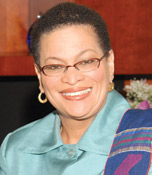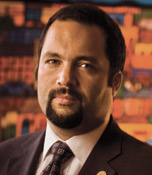Pitt to Host 'Race in America' June 3-6
The University of Pittsburgh’s School of Social Work and the Center on Race and Social Problems will host “Race in America”—designed to be the most solution-focused conference on race ever held—on the University’s Pittsburgh campus June 3-6.
Seven key areas will be explored during “Race in America”: economics, education, criminal justice, race relations, health, mental health, and families, youth, and the elderly. There will be two keynote speeches and a panel discussion, all open to the public, as well as 20 sessions for conference participants. Forty of the nation’s most prominent experts on race will give presentations in the conference sessions.
Conference participants—a multiracial group of researchers, policy makers, students, and community leaders—will be asked to identify the most pervasive instances of racial inequities, explore the factors that contribute to them, and work on actionable steps that can be taken at the federal, state, and local levels to help build greater equity in our society.
In addition to experts from Pitt, conference presenters are from Boston College; Brandeis University; Carnegie Mellon University; Georgetown University; Harvard University; Indiana University; the NAACP; New York University; Ohio State University; Texas A&M University; the University of Alabama-Birmingham; the University of California, Berkeley; the University of California, Los Angeles; the University of Michigan; the University of Minnesota; the University of North Carolina, Chapel Hill; the University of Texas; the University of Washington; the U.S. Census Bureau; and Washington University in St. Louis, among others.
Guest speakers will include:
 Julian Bond
Julian BondJulian Bond, longtime civil rights activist and former NAACP board chair, who will give a free public address titled “The Road to Freedom: From Alabama to Obama” at 7 p.m. June 3 at Soldiers & Sailors Memorial Hall and Museum;
 Julianne Malveaux
Julianne MalveauxJulianne Malveaux, economist and president of Bennett College for Women, who will give a free public address at 7 p.m. June 4 at The Twentieth Century Club, 4201 Bigelow Blvd., Oakland;
 Alex Castellanos
Alex CastellanosAlex Castellanos, partner at National Media, Inc., and a frequent guest commentator on CNN, who will moderate a free public panel discussion titled “Post-racial America—Does It and Should It Exist?” at 7 p.m. June 5 at The Twentieth Century Club; and
 Benjamin Jealous
Benjamin JealousBenjamin Jealous, president and CEO of the NAACP, who will be one of the panelists in that discussion.
Following the conference, a report and action plan for each of the seven areas of focus will be produced.
“Times of challenge provide the opportunity to create change,” says Larry E. Davis, dean of the School of Social Work, Donald M. Henderson Professor, and director of the Center on Race and Social Problems at Pitt. “As the nation continues its efforts to recover from an economic downturn, there has never been a better time to reexamine and correct racial inequalities in American society. It is our intent to make this the best conference ever on race in America. More importantly, it is our goal to make it the most useful one.”
For regular updates on the conference or to sign up for e-mail alerts, visit www.race.pitt.edu.
In 2002, Pitt’s School of Social Work established the Center on Race and Social Problems (CRSP)—the first race-research center to be housed in a school of social work. It has six foci: economic disparities; educational disparities; interracial group relations; mental health; youth, families, and the elderly; and criminal justice. CRSP fosters research by organizing research advisory panels, funding pilot studies, and assisting with funding applications. CRSP also mentors scholars through postdoctoral fellowships and guidance by senior faculty, and it disseminates knowledge through a lecture series, conferences, summer institutes, courses, and academic publications.
Research carried out by CRSP scholars has included Pittsburgh’s Racial Demographics: Differences and Disparities, the most comprehensive study ever done on quality-of-life issues for Pittsburgh’s Black, White, Asian, and Hispanic residents; Raising the Stakes, a report that suggested Allegheny County’s human services network is not prepared to adequately respond to the social ills surrounding casino gambling; and Allegheny County Jail Collaborative Evaluation Research, a study that revealed that providing services to Allegheny County Jail inmates while they are incarcerated and after their release dramatically reduces the chance of their returning to jail.
Other Stories From This Issue
On the Freedom Road

Follow a group of Pitt students on the Returning to the Roots of Civil Rights bus tour, a nine-day, 2,300-mile journey crisscrossing five states.
Day 1: The Awakening
Day 2: Deep Impressions
Day 3: Music, Montgomery, and More
Day 4: Looking Back, Looking Forward
Day 5: Learning to Remember
Day 6: The Mountaintop
Day 7: Slavery and Beyond
Day 8: Lessons to Bring Home
Day 9: Final Lessons

